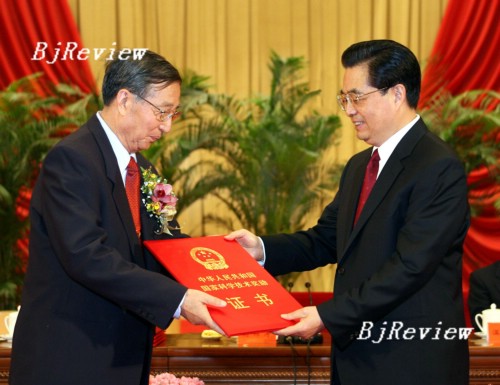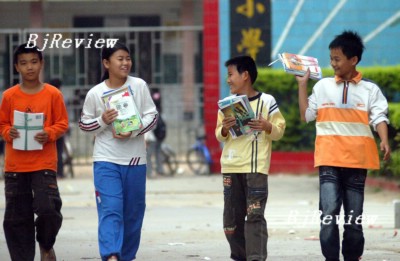Innovated and Motivated

President Hu Jintao presents China's supreme science-technology award to agronomist Li Zhensheng at a ceremony in Beijing on February 27.
With the high-profile presence of senior Chinese leadership, 327 awards were given out to scientists and enterprises that have made remarkable progress in scientific and technological innovation over the past year.
As the top prize winner, Li successfully developed a fine wheat strain that features drought endurance, heat and disease resistance and high output.
The research team of Jian-10 aircraft, a third-generation fighter, won the top technological progress prize, while the first prize for the natural science award went to two physics technologies.
Innovations from private enterprises accounted for more than 30 percent of the total number of prize winners.
The improvement of innovative capacity and strengthening of independent R&D have been unprecedentedly emphasized by China's Central Government in the building of an innovation-oriented country.

It's the pits, but loaded with energyThe Chinese Government will fund 2.6 million more rural households to build methane pits in 2007, according to the Ministry of Agriculture. Wei Chao'an, Vice Minister of Agriculture, said that the 2.6 million rural households would be selected from the western and other major grain-producing regions in the country.
The government will grant subsidies ranging from 800 yuan to 1,200 yuan for each household to build one pit for generating gas for cooking, heating and even for lighting by processing human and animal waste, Wei said.
Government statistics show that a total of 18 million rural families had each built a methane pit by the end of 2005.
An 8-cubic-meter methane pit can provide 80 percent of the energy needed by a four-member family to cook for a year. The 18 million methane pits produce energy equivalent to 10.9 million tons of coal and save 3.96 million hectares of forest.
Defining academic morality
The Chinese Academy of Sciences, the country's top scientific body, put forward a set of new regulations on February 26 on strengthening scientific honesty and curbing academic fraud.
Besides reiterating the basic principles for scientific conduct, such as honesty, publicity and fairness, the regulations also define scientific misconduct, detail punishment and put forward the establishment of a science ethics committee to supervise scientific research to deal with misconduct.
Following a string of scandals involving academic fraud and plagiarism, China issued a set of interim regulations on scientific misconduct late last year.
A national science ethics committee and a supervision office were also established in January to prevent academic fraud and plagiarism.
Retrial for death sentences
China's Supreme People's Court (SPC) will send back cases involving death sentences to provincial courts for retrial if it finds errors in judgement, instead of directly changing the sentence, according to a regulation released by the SPC on February 27.
From January 1 the SPC reassumed sole authority over death penalty reviews when it was empowered to ratify death sentences, rescind or change them or order a retrial.
"The new regulation will guarantee that death sentences are handed out with caution by ordering retrials, which will also improve the efficiency of SPC death penalty reviews," a SPC spokesman told Xinhua News Agency.
Under the new regulations, the SPC will only change original death penalty sentences in cases involving individual criminals facing multiple death sentences, or multiple criminals facing death penalties.
Crackdown on commercial bribery
China has sentenced 242 health workers on charges of commercial bribery and punished 270 others with Party or political disciplines during a nationwide crackdown on corruption in the health sector.
A total of 979 cases involving commercial bribery in purchasing and distribution of drug and medical equipment were investigated by supervision and judicial authorities during August 2005 and December 2006, Vice Health Minister Chen Xiaohong said.
In China, some companies and individuals offered commissions to health officials and staff to secure contracts for substandard drugs and medical equipment, resulting in medical accidents.
Illegal deals between health workers and drug dealers also contributed to rising medical expenses. Some doctors prescribed expensive drugs for which they received kickbacks which caused public distrust of hospitals.
Hi-tech to cool economy
In a new drive to check excessive growth of land supply to curb runaway fixed-assets investment and cool the economy, China has used satellite remote sensing techniques to check illegal land use in 90 cities, said an official with the Ministry of Land and Resources on February 27.
The official said satellite pictures using remote sensing techniques can show the changing of a city's newly used land for construction in a specified period, and thereby find out whether the involved land use breaks laws.
The government check will focus on activities like approving land that contravenes government plans and industrial policies and illegally expropriating farmland for construction.
| 